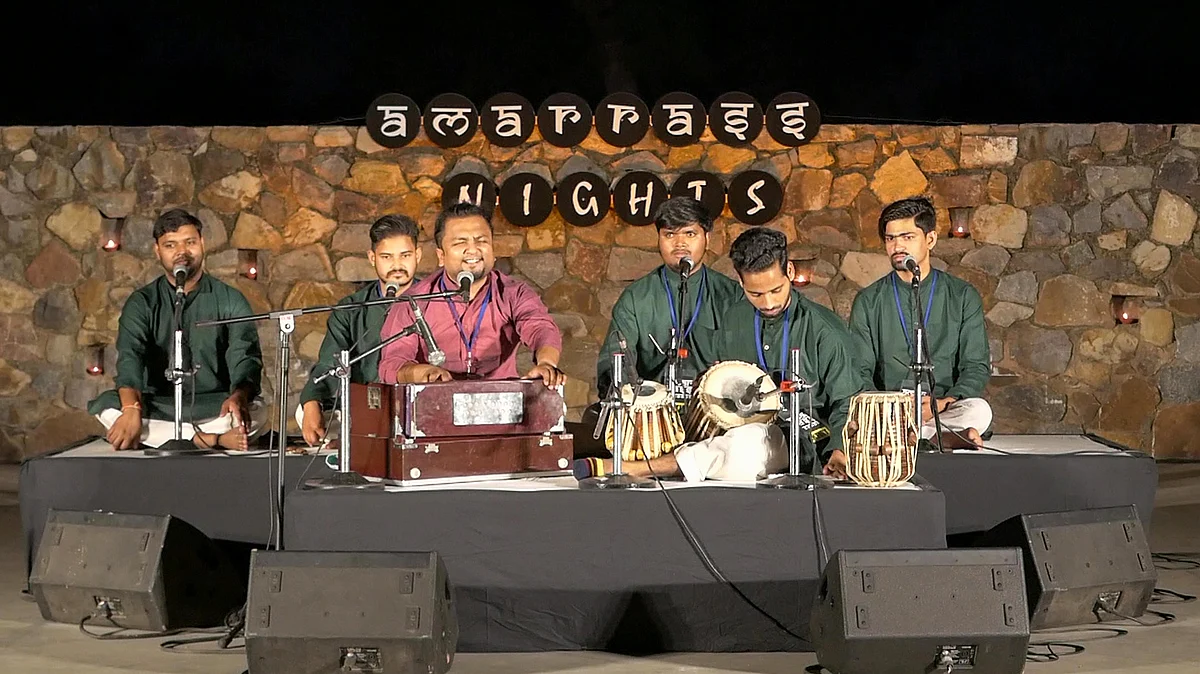Askari Naqvi And Rehmat-e-nusrat bring Mehfil-e-tarranum to life at Amarrass Nights
Amarrass Nights recently returned to Delhi’s Sunder Nursery with Mehfil-e-Tarranum—an evening of soulful musical performances laced with wholesome flavors of Awadh, Lucknow and Uttarakhand

After a hiatus enforced by the pandemic, Amarrass Nights recently returned to Delhi’s Sunder Nursery with Mehfil-e-Tarranum—an evening of soulful musical performances laced with wholesome flavors of Awadh, Lucknow and Uttarakhand. "The amazing turnout for Amarrass Nights has bestowed us with renewed energy. Good music needs amazing patrons, we will continue our musical path and we plan to make Amarass Nights a monthly affair in Delhi,” averred Ashutosh Sharma, Co-founder, Amarrass Records.
Askari Naqvi, a trained vocalist from Lucknow, began the evening with mesmerizing renditions that presented the cultural journey of Awadh and Lucknow weaved through couplets, songs and commentary based on different ragas and written in various Hindustani languages. “Growing up in the region of Awadh is much more complex than just Ganga-Jamuni Tehzeeb. However, examples of Ganga-Jamuni Tehzeeb can be seen very much in the literature and in various traditions, which have been there in Avadh for hundreds of years. The idea of Lucknow-o- Avadh is a result of churning of various ideological sources from Kabir to Meer, Anees to Dabeer, from Peer to Murids and from miryasins to families. Lucknow-o-Avadh is the closest in the memory of people than any other region where we saw and grew up in a very very complex cultural milieu,” explained Naqvi.
While explaining the nuances and culture context of the songs and ragas, Naqvi sang a bouquet of songs by Kabir, ghazals by Meer, tunes by Begum Akhtar, poems of a Sufi Shah Naeem Ata true to the legacy of Assemun Bua, a musician who lived in Avadh, and Ustad Abdul Rasheed Khan, a musician who lived in Raebareli. Some of the songs sung by Naqvi include ‘Jhinijhini’ by Kabir in Raag Bihag, ‘Dil Ki Baat Kahi Nahi Jaati’ by Meer Taqi Meer, ‘Krishna Ka Koon Pujari Ali Ka Banda Hoon’ by Yas Yagana Changezi, ‘Bhaj Rasna Hardam Ali Ali’ written by Shah Naeem Ata and originally sung by Aseemun Bua.

Naqvi was followed by Rehmat-e-Nusrat, a group of passionate young musicians from the hills of Uttarakhand, conceived and led by Sarvjeet Tamta. They enthralled the audience with the timeless tradition of Qawwali in their unique way. Their renditions of Sufiyana kalaams by Amir Khusrao, Meera Bai, and Baba Bulleh Shah, and the magical Qawwalis of Ustad Nusrat Fateh Ali Khan connected an instant bond with the listeners. They sang ‘Ae Risakhi,’ ‘Mai Jana Jogi De Naal’ and ‘Har Ek Baat Pe Kehte Ho’.
Rehmat-e-Nusrat were signed to the label Amarrass Records in November 2019, and performed at the first Amarrass Nights at the Sunder Nursery concert in January 2020. The group has performed at various college festivals around North India and introduced Sufi and Qawwali music to new audiences in their state.
Ever since its inception back in 2009, Amarrass has endeavored to create sustainable ecosystems that preserve, promote and nurture folk and traditional forms of music and arts. As part of the endeavor, ‘Amarrass Nights’ emerged as an integral platform to showcase young artists, as well as living legends. Amarrass Records and Amarrass Society for Performing Arts consider Amarrass Nights culturally significant series performances held monthly at iconic locations across Delhi, including Lodi Gardens, Qutab, and at Sunder Nursery, a UNESCO World Heritage Site and Delhi's first arboretum.
Follow us on: Facebook, Twitter, Google News, Instagram
Join our official telegram channel (@nationalherald) and stay updated with the latest headlines
